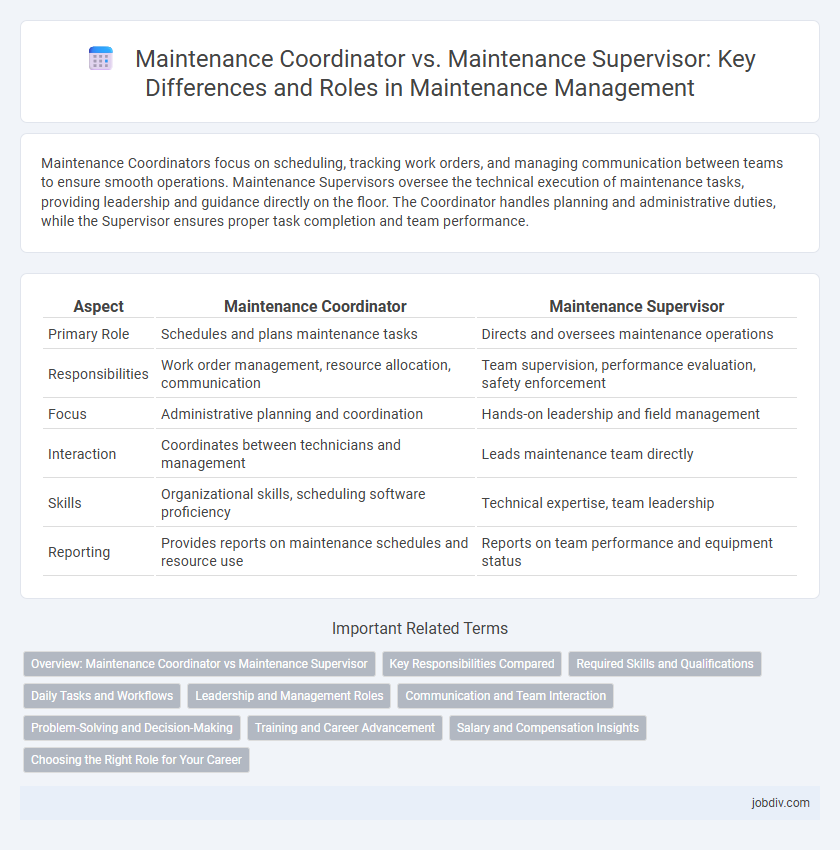Maintenance Coordinators focus on scheduling, tracking work orders, and managing communication between teams to ensure smooth operations. Maintenance Supervisors oversee the technical execution of maintenance tasks, providing leadership and guidance directly on the floor. The Coordinator handles planning and administrative duties, while the Supervisor ensures proper task completion and team performance.
Table of Comparison
| Aspect | Maintenance Coordinator | Maintenance Supervisor |
|---|---|---|
| Primary Role | Schedules and plans maintenance tasks | Directs and oversees maintenance operations |
| Responsibilities | Work order management, resource allocation, communication | Team supervision, performance evaluation, safety enforcement |
| Focus | Administrative planning and coordination | Hands-on leadership and field management |
| Interaction | Coordinates between technicians and management | Leads maintenance team directly |
| Skills | Organizational skills, scheduling software proficiency | Technical expertise, team leadership |
| Reporting | Provides reports on maintenance schedules and resource use | Reports on team performance and equipment status |
Overview: Maintenance Coordinator vs Maintenance Supervisor
A Maintenance Coordinator primarily handles scheduling, resource allocation, and communication to ensure that maintenance tasks are planned and executed efficiently. In contrast, a Maintenance Supervisor oversees the maintenance team directly, managing day-to-day operations, troubleshooting technical issues, and enforcing safety protocols. Both roles are integral to facility management, but the Coordinator focuses on administrative coordination while the Supervisor emphasizes hands-on leadership and technical oversight.
Key Responsibilities Compared
A Maintenance Coordinator primarily handles scheduling repairs, coordinating communications between technicians and management, and managing maintenance records to ensure timely equipment upkeep. In contrast, a Maintenance Supervisor oversees daily maintenance operations, directs maintenance staff, enforces safety protocols, and ensures compliance with operational standards. Both roles require strong organizational skills, but the Coordinator focuses more on administrative coordination while the Supervisor emphasizes leadership and hands-on supervision.
Required Skills and Qualifications
Maintenance Coordinators require strong organizational skills, proficiency in scheduling software, and excellent communication abilities to manage work orders and coordinate teams effectively. Maintenance Supervisors need in-depth technical knowledge, leadership experience, and the ability to troubleshoot complex mechanical or electrical issues while managing on-site maintenance activities. Both roles often demand a background in engineering or technical fields, with certifications such as CMMS (Computerized Maintenance Management System) training for Coordinators and safety and compliance certifications for Supervisors.
Daily Tasks and Workflows
Maintenance Coordinators oversee scheduling, resource allocation, and communication between teams to ensure efficient workflow and minimize downtime. Maintenance Supervisors manage on-site staff, monitor daily operations, and enforce safety protocols to maintain equipment functionality and compliance. Both roles collaborate to optimize maintenance schedules but differ in focus: coordinators handle planning and coordination, while supervisors emphasize execution and team leadership.
Leadership and Management Roles
Maintenance Coordinators prioritize planning and scheduling maintenance tasks, ensuring seamless communication between teams and maintaining detailed maintenance records. Maintenance Supervisors focus on direct leadership, managing on-site technicians, enforcing safety protocols, and overseeing real-time troubleshooting and repairs. Both roles require strong leadership, but Coordinators excel in operational management and resource allocation, while Supervisors emphasize hands-on team leadership and execution.
Communication and Team Interaction
Maintenance Coordinators excel in communication by serving as the primary liaison between maintenance teams and other departments, ensuring efficient scheduling and clear information flow. Maintenance Supervisors focus on direct team interaction, providing hands-on leadership, motivating technicians, and resolving on-site issues swiftly. Effective coordination requires combining a coordinator's organizational communication skills with a supervisor's active team engagement to maximize maintenance productivity.
Problem-Solving and Decision-Making
Maintenance Coordinators excel in problem-solving by analyzing work orders, prioritizing tasks, and allocating resources efficiently to minimize downtime. Maintenance Supervisors focus on decision-making by directing teams, addressing on-site issues promptly, and ensuring compliance with safety and operational standards. Both roles require strong technical knowledge, but Coordinators handle strategic planning while Supervisors manage tactical execution.
Training and Career Advancement
Maintenance Coordinators primarily handle scheduling and logistics, gaining expertise in workflow management through administrative training programs that enhance organizational skills. Maintenance Supervisors focus on technical training and team leadership development, acquiring hands-on experience with equipment maintenance and personnel management to prepare for higher managerial roles. Career advancement for Coordinators often leads to supervisory positions, while Supervisors may progress to maintenance management or operations leadership.
Salary and Compensation Insights
Maintenance Coordinators typically earn a median salary of $52,000 annually, with compensation packages often including performance bonuses and benefits such as health insurance and retirement plans. Maintenance Supervisors command higher salaries, averaging around $65,000 per year, reflecting their greater responsibility overseeing teams and maintenance schedules. Salary disparities also depend on industry, location, and company size, with supervisors in manufacturing or industrial sectors frequently receiving additional incentives and overtime pay.
Choosing the Right Role for Your Career
Choosing between a Maintenance Coordinator and a Maintenance Supervisor depends on your career goals and skillset; coordinators focus on planning, scheduling, and resource allocation, requiring strong organizational skills, while supervisors emphasize team leadership, on-site problem-solving, and technical expertise. Maintenance Coordinators excel in managing workflows and vendor relationships, optimizing maintenance processes, whereas Supervisors lead technicians directly, ensuring compliance with safety standards and operational efficiency. Aligning your strengths with these role-specific responsibilities maximizes career growth and job satisfaction in the maintenance industry.
Maintenance Coordinator vs Maintenance Supervisor Infographic

 jobdiv.com
jobdiv.com